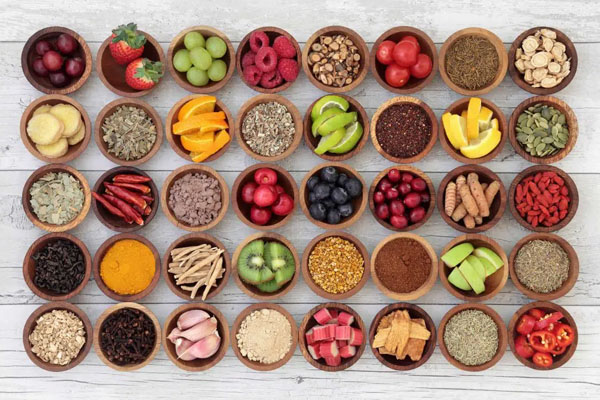Discover the incredible world of superfoods and their impact on your health Learn about the benefits, various uses, and find answers to frequently asked questions Explore the key to a healthier lifestyle with nutrient-packed superfoods
Why Are Superfoods Good for You? Superfoods are nutrient-packed, whole foods that offer a myriad of health benefits. They are rich in essential vitamins, minerals, antioxidants, and other bioactive compounds that support overall well-being. Whether you're looking to enhance your heart health, boost your immune system, improve cognitive function, or manage your weight, superfoods can play a significant role in achieving these goals. In this article, we will delve into the definition, characteristics, and various benefits of superfoods, as well as provide you with tips on incorporating them into your diet for a healthier and more vibrant life.
What Are Superfoods?
Definition and Characteristics
Superfoods are a category of foods that are renowned for their exceptional nutritional density and health-promoting properties. They are characterized by several key attributes that make them stand out in the world of nutrition:
1. Nutrient Density
Superfoods are incredibly nutrient-dense, which means they provide a high concentration of essential nutrients, including vitamins, minerals, and antioxidants, relative to their calorie content. This characteristic makes them an excellent choice for those looking to maximize their nutritional intake while managing their caloric consumption.
2. Rich in Antioxidants
One of the defining features of superfoods is their high antioxidant content. Antioxidants are compounds that help protect the body from oxidative stress and free radical damage. Superfoods, such as berries, dark leafy greens, and certain spices like turmeric, are loaded with antioxidants, which contribute to overall health and may reduce the risk of chronic diseases.
3. Unique Phytochemicals
Superfoods often contain specific phytochemicals that contribute to their health benefits. Phytochemicals are natural compounds found in plants that have various biological effects on the human body. For example, cruciferous vegetables like broccoli and kale contain sulforaphane, a phytochemical with potential anti-cancer properties.
4. High Fiber Content
Most superfoods are excellent sources of dietary fiber. Fiber is essential for digestive health, promoting regular bowel movements, and preventing constipation. Additionally, fiber can help with weight management and may lower the risk of conditions like heart disease and type 2 diabetes.
5. Omega-3 Fatty Acids
Certain superfoods, particularly fatty fish like salmon, sardines, and mackerel, are prized for their high omega-3 fatty acid content. Omega-3 fatty acids are well-known for their anti-inflammatory properties and their role in supporting heart and brain health.
6. Whole and Unprocessed
Superfoods are typically whole, unprocessed foods. This means they are as close to their natural state as possible, with minimal additives, preservatives, or artificial ingredients. This characteristic ensures that you get the full spectrum of nutrients in the food, as nature intended.
In summary, superfoods are a class of nutrient-packed foods with an array of health-enhancing qualities. Their nutrient density, antioxidant content, unique phytochemicals, high fiber levels, omega-3 fatty acids, and whole, unprocessed nature make them an ideal choice for those seeking to optimize their nutrition and promote well-being.
Examples of Superfoods
Superfoods come in a wide variety, and they can be found in different food groups. Here are some noteworthy examples of superfoods:
1. Berries
Berries like blueberries, strawberries, and blackberries are packed with vitamins, antioxidants, and dietary fiber. They are known for their potential to improve cognitive function, support heart health, and enhance skin health.
2. Leafy Greens
Leafy green vegetables, including kale, spinach, and Swiss chard, are rich in vitamins, minerals, and phytochemicals. They are excellent sources of folate, which is essential for cell division and overall health. Leafy greens are also known for their potential to reduce the risk of chronic diseases like heart disease and certain cancers.
3. Fatty Fish
Fatty fish such as salmon, mackerel, and sardines are renowned for their high omega-3 fatty acid content. These essential fatty acids have anti-inflammatory properties and are beneficial for heart health, brain function, and joint health.
4. Nuts and Seeds
Nuts like almonds, walnuts, and seeds like chia seeds and flaxseeds are rich in healthy fats, protein, and fiber. They are known to support weight management, reduce the risk of heart disease, and provide essential nutrients like magnesium and vitamin E.
5. Whole Grains
Whole grains such as quinoa, oats, and brown rice are loaded with fiber, vitamins, and minerals. They are excellent sources of complex carbohydrates, which provide sustained energy and help control blood sugar levels. Whole grains are linked to a reduced risk of type 2 diabetes and digestive health.
6. Turmeric
Turmeric, a vibrant yellow spice, contains the active compound curcumin, which has potent anti-inflammatory and antioxidant properties. It is believed to have a wide range of health benefits, including reducing inflammation, supporting joint health, and potentially protecting against certain chronic diseases.
7. Greek Yogurt
Greek yogurt is a probiotic-rich dairy product that provides essential nutrients, including calcium and protein. It supports gut health, aids digestion, and may help boost the immune system. Opt for low-fat or non-fat varieties to reduce saturated fat intake.
8. Avocado
Avocado is a unique fruit that is high in heart-healthy monounsaturated fats. It is also a good source of fiber, potassium, and various vitamins. Avocado consumption is associated with improved heart health, reduced cholesterol levels, and better weight management.
These are just a few examples of superfoods, and there are many more to explore. Incorporating a variety of superfoods into your diet can help you reap their numerous health benefits and enhance your overall well-being.
Why Are Superfoods Good for Your Health?
Nutrient-Rich Benefits
The nutrient density of superfoods is a key factor contributing to their numerous health benefits. Let's explore the nutrient-rich benefits in more detail:
1. Vitamins and Minerals
Superfoods are brimming with essential vitamins and minerals that play vital roles in maintaining overall health. For example, spinach is rich in vitamin K, crucial for blood clotting, while sweet potatoes provide ample vitamin A, essential for vision and immune function. By incorporating superfoods into your diet, you can ensure you're getting a diverse array of these micronutrients, supporting various bodily functions.
2. Antioxidant Power
The high antioxidant content in superfoods is one of their standout features. Antioxidants are compounds that combat oxidative stress and help protect your cells from damage. Superfoods like blueberries, for instance, contain antioxidants called anthocyanins, which are known for their potential to improve cognitive function and reduce the risk of age-related cognitive decline.
3. Dietary Fiber
Fiber is abundant in many superfoods, contributing to digestive health and promoting feelings of fullness. Dietary fiber supports regular bowel movements, reduces the risk of constipation, and may lower the risk of conditions like heart disease and type 2 diabetes. Foods like quinoa and chia seeds are excellent sources of dietary fiber.
4. Healthy Fats
Some superfoods, such as avocados and fatty fish, provide healthy fats like monounsaturated and omega-3 fatty acids. These fats are beneficial for heart health, reducing inflammation, and supporting brain function. By including these superfoods in your diet, you can help maintain a healthy cardiovascular system and potentially reduce the risk of chronic diseases.
5. Protein Content
Superfoods like quinoa, nuts, and seeds offer significant protein content, making them valuable for vegetarians and vegans. Protein is essential for muscle growth, tissue repair, and overall body function. Including these protein-rich superfoods in your diet can help meet your protein needs without relying on animal-based sources.
6. Immune Support
Several superfoods, such as citrus fruits and red bell peppers, are packed with vitamin C, which is known for its immune-boosting properties. Adequate vitamin C intake is vital for maintaining a strong immune system, helping the body fight off illnesses and infections.
By incorporating superfoods into your diet, you can harness the nutrient-rich benefits they offer, supporting overall health, boosting your immune system, and providing essential vitamins, minerals, antioxidants, dietary fiber, and healthy fats for your body's well-being.
Antioxidant Properties
The antioxidant properties of superfoods are a cornerstone of their health benefits. These properties are attributed to the presence of various antioxidants that protect the body from oxidative stress and free radical damage. Let's delve deeper into the antioxidant properties of superfoods:
1. Free Radical Defense
Free radicals are unstable molecules that can damage cells and contribute to aging and diseases. Superfoods, like dark berries and leafy greens, are loaded with antioxidants that neutralize free radicals, reducing their potential harm. Antioxidants like vitamin C, vitamin E, and polyphenols play a crucial role in this defense mechanism.
2. Inflammation Reduction
Chronic inflammation is linked to many diseases, including heart disease, cancer, and diabetes. Some superfoods, such as turmeric, contain antioxidants with potent anti-inflammatory effects. Curcumin, a compound found in turmeric, is well-known for its ability to reduce inflammation and may help alleviate symptoms of inflammatory conditions.
3. Skin Health
The skin is vulnerable to oxidative damage from UV radiation and environmental toxins. Superfoods rich in antioxidants, like tomatoes and green tea, can help protect the skin. The lycopene in tomatoes, for instance, has been associated with reducing the risk of sunburn and promoting healthy skin aging. Green tea's polyphenols can also support skin health and may have anti-aging effects.
4. Cognitive Function
The brain is susceptible to oxidative stress, which can contribute to cognitive decline and neurodegenerative diseases. Superfoods with antioxidant-rich compounds, such as blueberries and walnuts, may support brain health. Blueberries, in particular, have been linked to improved cognitive function and may help protect against age-related cognitive decline.
5. Heart Health
Oxidative stress can damage the arteries and contribute to heart disease. Superfoods like dark chocolate, which contains flavonoids, have been associated with reduced heart disease risk. These antioxidants can help lower blood pressure and improve vascular function, supporting overall cardiovascular health.
6. Immune System Support
A strong immune system relies on antioxidants to combat free radicals and maintain proper immune function. Superfoods like citrus fruits, rich in vitamin C, are essential for immune support. Vitamin C's antioxidant properties help the body fight off infections and illnesses, ensuring a robust immune system.
Superfoods' antioxidant properties play a pivotal role in safeguarding the body from various health risks, ranging from skin issues and cognitive decline to heart disease and immune system strength. By incorporating antioxidant-rich superfoods into your diet, you can promote overall well-being and protect your body from the detrimental effects of oxidative stress.
Potential Health Benefits
Superfoods offer a wide range of potential health benefits due to their exceptional nutrient profile and antioxidant-rich properties. Let's explore these benefits in more detail:
1. Heart Health
Several superfoods, such as fatty fish, nuts, and dark chocolate, are known for their potential to support heart health. Omega-3 fatty acids in fatty fish can help reduce the risk of heart disease, while nuts provide healthy fats and antioxidants that contribute to lower cholesterol levels. Dark chocolate's flavonoids may improve vascular function and lower blood pressure.
2. Weight Management
Superfoods like quinoa, chia seeds, and leafy greens are high in dietary fiber and protein, which promote feelings of fullness and satiety. This can help with weight management and appetite control, making these foods valuable additions to a balanced diet.
3. Cognitive Function
Antioxidant-rich superfoods, such as blueberries, walnuts, and fatty fish, have been associated with improved cognitive function. These foods may enhance memory, learning, and overall brain health, potentially reducing the risk of cognitive decline with age.
4. Digestive Health
Superfoods that are rich in dietary fiber, like whole grains, promote digestive health. Fiber helps prevent constipation and supports regular bowel movements. It also contributes to a healthy gut microbiome, which is essential for overall well-being.
5. Reduced Inflammation
Superfoods like turmeric and green tea contain antioxidants and anti-inflammatory compounds that can help reduce chronic inflammation. This, in turn, may lower the risk of inflammation-related diseases, including arthritis, heart disease, and cancer.
6. Skin Health
Superfoods with high antioxidant content, such as tomatoes and green tea, are known to protect the skin from UV damage and promote healthy skin aging. The antioxidants in these foods can contribute to a radiant complexion and reduced risk of skin issues.
7. Immune Support
A well-functioning immune system is crucial for staying healthy. Superfoods that are rich in vitamin C, like citrus fruits, enhance the immune response, making the body more resilient against infections and illnesses.
By incorporating a variety of superfoods into your diet, you can potentially enjoy a wide array of health benefits, from improved heart health and weight management to enhanced cognitive function and digestive health. These nutrient-packed foods can contribute to your overall well-being and help you maintain a healthier, more energetic lifestyle.
How to Incorporate Superfoods into Your Diet
Recipes and Meal Ideas
Incorporating superfoods into your daily diet can be both delicious and nutritious. Here are some recipes and meal ideas that feature these nutrient-packed ingredients:
1. Superfood Smoothie
Blend a superfood smoothie by combining spinach, kale, blueberries, Greek yogurt, and a drizzle of honey. This refreshing and nutrient-dense smoothie is an excellent way to start your day with a boost of vitamins, minerals, and antioxidants.
2. Quinoa Salad
Create a hearty quinoa salad with diced avocados, cherry tomatoes, cucumbers, and a drizzle of olive oil and lemon juice. Quinoa, known for its high protein and fiber content, pairs perfectly with these superfood ingredients for a satisfying and healthy meal.
3. Salmon with Salsa
Bake a salmon fillet and top it with a homemade salsa made from diced mango, red onion, cilantro, and lime juice. Salmon's omega-3 fatty acids combined with the fresh flavors of the salsa make for a delightful and heart-healthy dish.
4. Berry Parfait
Create a berry parfait by layering Greek yogurt with fresh mixed berries and a sprinkle of granola. This superfood-rich dessert or breakfast option offers a delightful combination of antioxidants, protein, and dietary fiber.
5. Turmeric Infusion
Brew a soothing turmeric infusion by simmering turmeric, black pepper, and honey in warm milk or a dairy-free alternative. Turmeric's anti-inflammatory properties and antioxidants make it an excellent addition to your daily routine for overall well-being.
6. Green Tea Quencher
Prepare a refreshing iced green tea quencher with a touch of honey and fresh lemon slices. Green tea is abundant in antioxidants and can be a satisfying, low-calorie beverage choice that supports your health.
These recipe ideas are just a starting point for incorporating superfoods into your meals. By exploring creative ways to include superfoods in your diet, you can enjoy a diverse and delicious range of dishes that promote overall well-being while tantalizing your taste buds.
Shopping and Storage Tips
When it comes to superfoods, making the right choices at the store and ensuring proper storage can help you get the most out of these nutrient-rich ingredients. Here are some tips to consider:
1. Choosing Superfoods
When shopping for superfoods, opt for fresh, organic, and locally sourced varieties whenever possible. Fresh produce and unprocessed items tend to retain more nutrients. Look for bright colors in fruits and vegetables, as these often indicate higher antioxidant content.
2. Seasonal Selection
Choosing superfoods that are in season can ensure better freshness and flavor. In-season produce is typically more affordable and widely available at local markets. Plus, it supports sustainable agriculture practices.
3. Storage Guidelines
Proper storage is essential to maintain the nutritional quality of superfoods. Here are some storage tips:
- Fruits and Vegetables: Store these items in the refrigerator to keep them fresh. Use perforated plastic bags to prevent moisture buildup.
- Fatty Fish: Freeze fatty fish if you don't plan to use them immediately. They'll keep well and preserve their omega-3 content.
- Nuts and Seeds: Keep these in a cool, dry place, such as an airtight container in the pantry. Refrigerate or freeze them to extend their shelf life if necessary.
- Herbs and Spices: Store herbs in the refrigerator or freeze them in oil or water for longer use. Keep spices in a cool, dark place away from direct sunlight to maintain their flavor and potency.
4. Food Preparation
When preparing superfoods, consider cooking methods that preserve their nutrient content. Steaming, sautéing, or consuming certain superfoods raw can help retain their vitamins, minerals, and antioxidants. Avoid overcooking, which can lead to nutrient loss.
5. Batch Cooking
If you have limited time, consider batch cooking and freezing superfood-based meals. This way, you can conveniently enjoy nutrient-rich dishes even on busy days, ensuring a consistent intake of these health-promoting ingredients.
By following these shopping and storage tips, you can make the most of superfoods' nutritional value, ensuring that they remain fresh, flavorful, and beneficial to your health. Making informed choices at the store and in your kitchen can enhance your overall well-being.
FAQs:Common Questions About Superfoods
Q1: What are superfoods, and why are they called superfoods?
A1: Superfoods are nutrient-dense foods that are exceptionally rich in vitamins, minerals, antioxidants, and other essential nutrients. They are often referred to as "superfoods" because they offer a wide range of health benefits and are known to promote overall well-being due to their outstanding nutritional content.
Q2: Are superfoods a recent dietary trend, or have they been consumed for a long time?
A2: Many superfoods have been consumed for centuries in various cultures for their health-promoting properties. Examples like quinoa, turmeric, and berries have been part of traditional diets and natural remedies. The recent surge in interest is driven by a growing awareness of their potential health advantages.
Q3: Can I get all the necessary nutrients from superfoods alone, or do I need a balanced diet?
A3: While superfoods offer exceptional nutritional benefits, a balanced diet that includes a variety of foods is still essential to ensure you get all the necessary nutrients. Superfoods can be a valuable addition, but they should complement a well-rounded diet for optimal health.
Q4: Are superfoods suitable for everyone, including children and the elderly?
A4: Superfoods can be part of a healthy diet for people of all ages, but individual dietary needs vary. Some superfoods may need to be introduced gradually, and specific dietary considerations may apply to children, the elderly, or individuals with certain medical conditions. Consulting with a healthcare professional or nutritionist is advisable for personalized guidance.
Q5: Are there any potential side effects or allergies associated with superfoods?
A5: While superfoods offer numerous health benefits, some individuals may be sensitive or allergic to certain superfood ingredients. For example, people with allergies to nuts or seeds should be cautious with these superfoods. It's important to be aware of any food allergies or sensitivities and consult a healthcare provider if you have concerns about specific superfoods.









